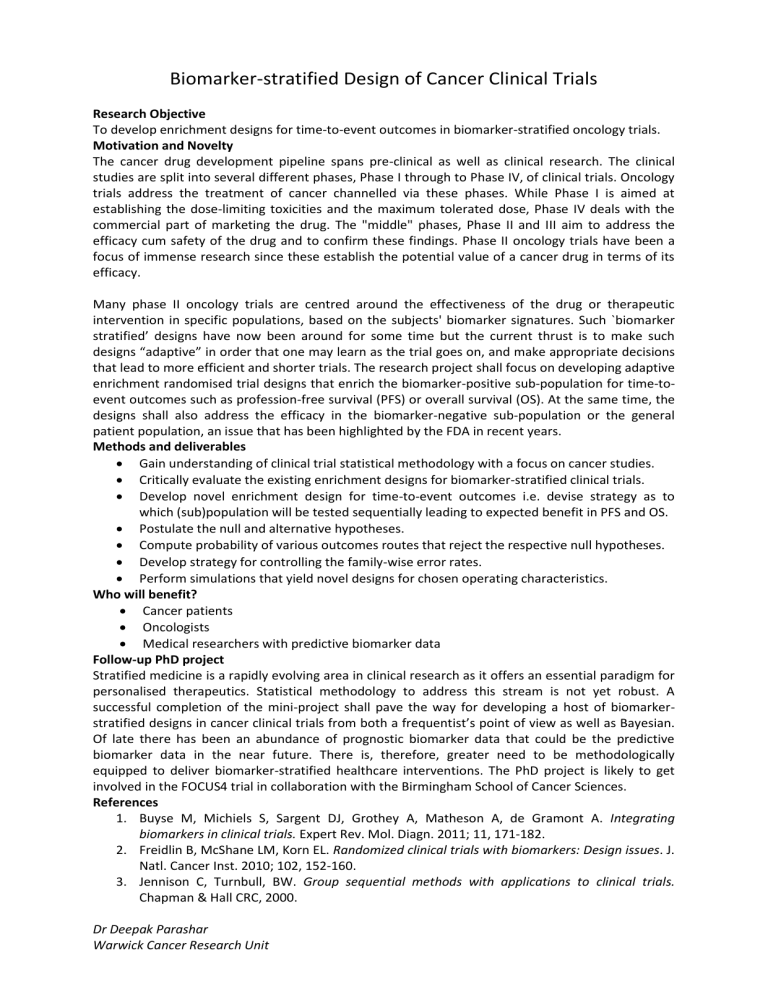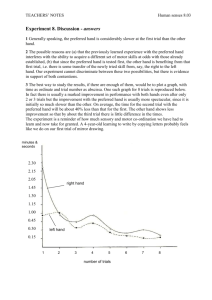Biomarker-stratified Design of Cancer Clinical Trials

Biomarker-stratified Design of Cancer Clinical Trials
Research Objective
To develop enrichment designs for time-to-event outcomes in biomarker-stratified oncology trials.
Motivation and Novelty
The cancer drug development pipeline spans pre-clinical as well as clinical research. The clinical studies are split into several different phases, Phase I through to Phase IV, of clinical trials. Oncology trials address the treatment of cancer channelled via these phases. While Phase I is aimed at establishing the dose-limiting toxicities and the maximum tolerated dose, Phase IV deals with the commercial part of marketing the drug. The "middle" phases, Phase II and III aim to address the efficacy cum safety of the drug and to confirm these findings. Phase II oncology trials have been a focus of immense research since these establish the potential value of a cancer drug in terms of its efficacy.
Many phase II oncology trials are centred around the effectiveness of the drug or therapeutic intervention in specific populations, based on the subjects' biomarker signatures. Such `biomarker stratified’ designs have now been around for some time but the current thrust is to make such designs “adaptive” in order that one may learn as the trial goes on, and make appropriate decisions that lead to more efficient and shorter trials. The research project shall focus on developing adaptive enrichment randomised trial designs that enrich the biomarker-positive sub-population for time-toevent outcomes such as profession-free survival (PFS) or overall survival (OS). At the same time, the designs shall also address the efficacy in the biomarker-negative sub-population or the general patient population, an issue that has been highlighted by the FDA in recent years.
Methods and deliverables
Gain understanding of clinical trial statistical methodology with a focus on cancer studies.
Critically evaluate the existing enrichment designs for biomarker-stratified clinical trials.
Develop novel enrichment design for time-to-event outcomes i.e. devise strategy as to which (sub)population will be tested sequentially leading to expected benefit in PFS and OS.
Postulate the null and alternative hypotheses.
Compute probability of various outcomes routes that reject the respective null hypotheses.
Develop strategy for controlling the family-wise error rates.
Perform simulations that yield novel designs for chosen operating characteristics.
Who will benefit?
Cancer patients
Oncologists
Medical researchers with predictive biomarker data
Follow-up PhD project
Stratified medicine is a rapidly evolving area in clinical research as it offers an essential paradigm for personalised therapeutics. Statistical methodology to address this stream is not yet robust. A successful completion of the mini-project shall pave the way for developing a host of biomarkerstratified designs in cancer clinical trials from both a frequentist’s point of view as well as Bayesian.
Of late there has been an abundance of prognostic biomarker data that could be the predictive biomarker data in the near future. There is, therefore, greater need to be methodologically equipped to deliver biomarker-stratified healthcare interventions. The PhD project is likely to get involved in the FOCUS4 trial in collaboration with the Birmingham School of Cancer Sciences.
References
1.
Buyse M, Michiels S, Sargent DJ, Grothey A, Matheson A, de Gramont A. Integrating biomarkers in clinical trials.
Expert Rev. Mol. Diagn. 2011; 11, 171-182.
2.
Freidlin B, McShane LM, Korn EL. Randomized clinical trials with biomarkers: Design issues . J.
Natl. Cancer Inst. 2010; 102, 152-160.
3.
Jennison C, Turnbull, BW. Group sequential methods with applications to clinical trials.
Chapman & Hall CRC, 2000.
Dr Deepak Parashar
Warwick Cancer Research Unit



